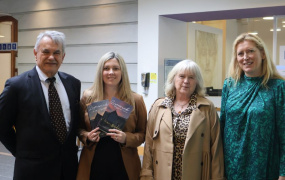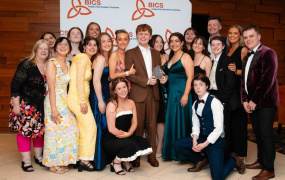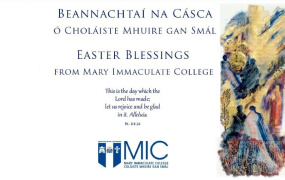Access & Disability Office
About
Mary Immaculate College is committed to widening participation and achieving equity of access to higher education for students from under-represented groups in third level, including socio-economically disadvantaged students, students with a disability, students from minority backgrounds and mature students.
Overview of Access Services
Pre-Entry Services
Advice and information for prospective students on Access issues.
Current Students Services
Daily Drop-in Support
Personal support for students facilitated by an open door policy. Information, advice and advocacy assistance provided where appropriate. Provision of College-related practical supports.
Needs Assessments for Learners with Disabilities
Specific learning difficulties and long term medical conditions to determine the supports and assistance required to enable student(s) reach their academic potential.
Financial assistance
Information on the Student Assistance Fund and other sources of financial assistance available to eligible students to help with costs of attending college.
Access & Disability Office Location
MIC Limerick - Room G04, Foundation Building (ground floor)
Office Opening Hours: Monday to Friday, 9.30am - 12.30pm and 2pm - 4pm
MIC Thurles - P122, Main Building (first floor)
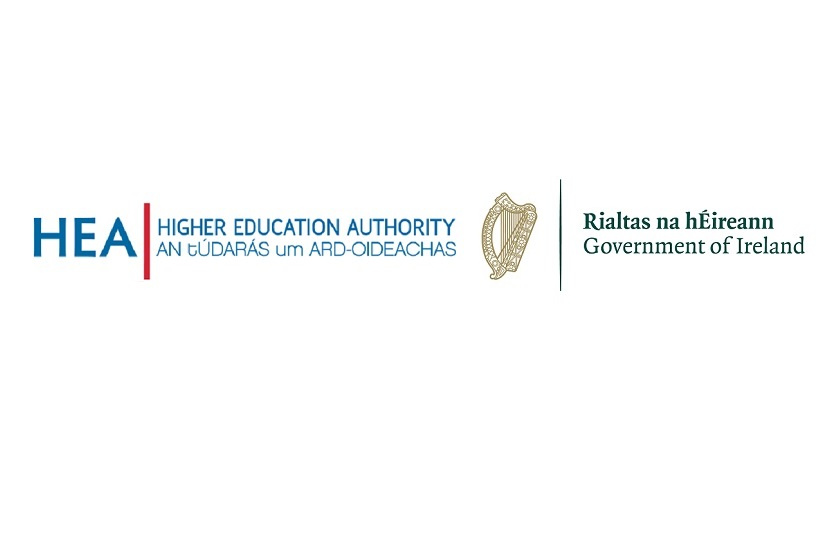
Staff
Policies
MIC Access Policy
1.1 Mary Immaculate College is committed to a policy of equal opportunity in education and to ensuring that students have as complete and equitable access to all facets of College life as can reasonably be provided.
In keeping with the College Mission Statement, which 'strives to promote equity in society and to provide an environment where all have freedom and opportunity to achieve their full potential,' the College endeavours to achieve equity of access to higher education for students from under-represented groups in third level, including socio-economically disadvantaged students, students with a disability and mature students.
These initiatives are consistent with the aims of the Higher Education Authority’s National Office for the Equity of Access to Higher Education. The College is committed to increasing its targets for increased participation for all groups and improving access activities is central to the College’s overall institutional strategy and policy
1.2 This policy derives from a philosophy of inclusion, which is dedicated to providing necessary support services wherever possible.
1.3 Responsibility for the implementation of the College’s access policy is communal and will be facilitated by the College’s Access/Disability Officer who will liaise with the appropriate departments, staff and students of the College. It is within the remit of the Access/Disability Officer to provide and arrange for the provision of assistance and guidance to access services.
1.4 In providing for students from under-represented groups in third level, the College will have particular regard for the human dignity, freedom and independence of each individual and the importance of confidentiality.
1.5 The College will seek to publicise its services in targeted disadvantaged areas and increase its involvement in community-based initiatives in such areas. The College’s Prospectuses and course brochures shall contain information on all access routes to the College.
Access Routes to Third Level
The Higher Education Access Route (HEAR) and the Disability Access Route to Education (DARE) are two undergraduate entrance schemes running at Mary Immaculate College.
Please see the MIC Admissions Office for more alternative admission routes.
Disability Access Route to Education (DARE)
The Disability Access Route to Education (DARE) is a third level alternative admissions scheme for school-leavers whose disabilities have had a negative impact on their second level education.
See below for Frequently Asked Questions about DARE.
DARE offers reduced points places to school leavers who as a result of having a disability have experienced additional educational challenges in second level education.
MIC reserves reduced points’ places for eligible DARE and HEAR applicants on undergraduate courses. A minimum of 5% of first year intake is reserved for students entering Mary Immaculate College.
DARE is for school leavers under the age of 23 as of 1 January 2023, who have the ability to benefit from and succeed in higher education, but who may not be able to meet the points for their preferred course due to the impact of a disability on their second level education. Applicants to DARE can present with an Irish Leaving Certificate, A-Levels and other EU qualifications.
For information about the process of applying to DARE including the deadlines and criteria, please check the Access College website: www.accesscollege.ie
To be considered for a reduced point DARE place you must:
- Be eligible for DARE
- Meet minimum entry requirements. As the minimum entry and subject requirements may be different for each course, applicants should check the prospectus for the requirements of each preference listed on your CAO form
- Achieve, in most cases, a minimum of 300 points
- Eligible DARE applicants must come within a differential of 40 CAO points below the standard CAO for the relevant year
- Eligible DARE applicants must meet specific programme requirements. Once these requirements have been met, MIC normally allocates the reduced point’s places to eligible applicants who come nearest to the full points for their preferred course. Please note that certain categories of DARE students will be prioritised.
Research has identified that students with physical and sensory disabilities are particularly under-represented in higher education relative to all students with disabilities in Ireland. In order to increase the numbers of DARE students with physical and sensory disabilities being admitted to higher education, the DARE colleges have agreed to prioritise these two groups when allocating reduced points places.
Eligible applicants with physical and sensory disabilities can only be prioritised where they have met all the admissions criteria for consideration.
Research has identified that students with disabilities from disadvantaged backgrounds face considerable challenges in terms of their chances of progressing to higher education in Ireland. In order to increase the number of students facing the ‘double disadvantage’ of economic disadvantage and disability, DARE and HEAR colleges have agreed to prioritise applicants eligible for both DARE and HEAR when allocating reduced points places. Applicants eligible for both schemes can only be prioritised where they have met all the admissions criteria for consideration.
Students eligible for DARE and who wish to defer their place should follow the College's deferral procedures. Contact Student Academic Administration (SAA) for more information.
Please visit www.accesscollege.ie.
Email: AccessOffice@mic.ul.ie
Higher Education Access Route (HEAR)
The Higher Education Access Route (HEAR) is a third level alternative admissions scheme which offers places on reduced points and extra college supports to school leavers from socio-economically disadvantaged backgrounds who are resident in the Republic of Ireland.
HEAR has been set up by a number of colleges and universities as evidence shows that socio-economic disadvantage can have a negative effect on how well a student does at school and whether they go to college.
MIC reserves reduced points’ places for eligible DARE and HEAR applicants on all undergraduate courses. A minimum of 5% of first year intake is reserved for students entering Mary Immaculate College through HEAR and DARE on reduced points.
HEAR is for school leavers under the age of 23 as of 1 January 2023 who are resident in the Republic of Ireland. HEAR applicants must meet a range of financial, social and cultural indicators to be considered for a reduced points place and extra college support.
For information about the process of applying to HEAR including the deadlines and criteria, please check the Access College website.
MIC reserves reduced points’ places for eligible HEAR applicants on all undergraduate courses.
To be considered for a reduced point HEAR place you must
- Be eligible for HEAR
- Meet minimum entry requirements. As the minimum entry and subject requirements may be different for each course, applicants should check the prospectus for the requirements of each preference listed on your CAO form
- Achieve, in most cases, a minimum of 300 points
- Eligible HEAR applicants must come within a differential of 40 CAO points below the standard CAO for the relevant year
- Eligible HEAR applicants must meet specific programme requirements. Once these requirements have been met, MIC normally allocates the reduced point’s places to eligible applicants who come nearest to the full points for their preferred course. Please note that students eligible for both HEAR and DARE will be prioritised.
Research has identified that students with disabilities from disadvantaged backgrounds face considerable challenges in terms of their chances of progressing to higher education in Ireland. In order to increase the number of students facing the ‘double disadvantage’ of economic disadvantage and disability, HEAR and DARE colleges have agreed to prioritise applicants eligible for both HEAR and DARE when allocating reduced points places. Applicants eligible for both schemes can only be prioritised where they have met all the admissions criteria for consideration.
Students who receive a HEAR offer must attend an orientation programme on campus.
Students eligible for HEAR and who wish to defer their place should follow the College's deferral procedures. Contact Student Academic Administration (SAA) for more information.
Please visit www.accesscollege.ie.
Email: AccessOffice@mic.ul.ie
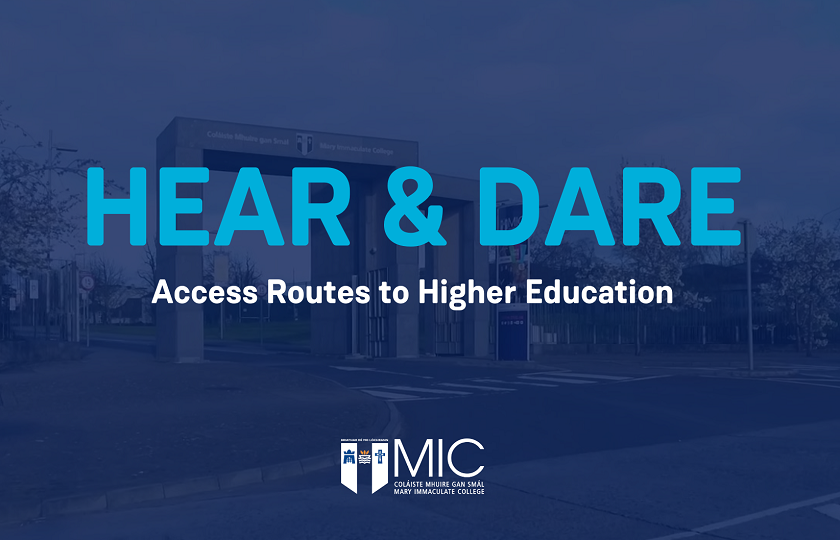
Disability Supports
Registering with the Disability Support Service
Students with a disability, specific learning difficulties and significant ongoing conditions can register for a range of post-entry supports, including:
- Academic Learning support
- Assistive Technology
- Exam Accommodations
- Classroom Accommodations
Registration with the College Disability Support Service is a separate process to registering as a student. All students with a disability, specific learning difficulty, and significant ongoing medical conditions should register with the College Disability Service. You can register with the Disability Service at any stage during your academic programme.
Students will be directed to the Disability Registration Portal. In order to register, documentary evidence of a disability is required from the relevant Health Professional/Consultant or Educational Psychologist. Students admitted under the DARE scheme will not be required to provide these reports as the College can access their documentation from the students DARE CAO Application
In order to complete the registration, Students must attend a Needs Assessment with the Access Officer in order to determine their needs and agree on a support plan.
Please email AccessOffice@mic.ul.ie to schedule an appointment.
The Quiet Zone
A number of Quiet Zones have been created around the Limerick Campus to support the health and well-being of students. Our Sensory Room is located in T101B and we have two Silent Booths, one outside the SU Office in the TARA Building and the other outside the Library.
The Assistive Technology Room
MIC has opened an Assistive Technology Room, complete with technology designed for use by people with a range of disabilities, so that more students can access College courses without barriers. The Assistive Technology Room has height adjustable desks, desktops computers with software to accommodate students with literacy difficulties, processing, physical and sensory difficulties. Students using the Assistive Technology Room will be assessed to establish their needs and trained to use the right technology to become more independent learners.
Education Support Worker
An Education Support Worker provides individual assistance to students with disabilities to support the student’s learning and to help them reach their full potential. Examples of the support provided includes: note-taking for students, academic learning support, mobility around the campus etc.
Click here for more information about Education Support Worker.
Prospective International Students
Prospective international students are required to register with Disability Support Services in order for us to put academic and exam supports in place. Documentation regarding your disability should be submitted, and a Needs Assessment will take place with Disability Service and reasonable academic accommodations will be agreed upon.
If you have any other questions about Disability Support Services in Mary Immaculate College, please email: AccessOffice@mic.ul.ie.
Fund for Students with Disabilities
The Fund for Students with Disabilities is managed by the Higher Education Authority on behalf of the Department of Further and Higher Education, Research, Innovation and Science.
The purpose of the Fund for Students with Disabilities (FSD) is to assist further and higher education institutions in ensuring students with disabilities have the necessary assistance and equipment to enable them to access, fully participate in and successfully complete their chosen course of study. The FSD operates in addition to mainstream resources and services in place in Higher Education Institutions (HEIs).
Application for the first time can be made during any year of study on an approved course at further or higher education level.
Applications to the fund are made on behalf of an eligible student by their college following an assessment of need. Applications cannot be made directly to the Fund by students.The funding is allocated to the college, not the student. The college has full discretion in decision on the allocation of the Fund at local level, and remains responsible for the management of the funding throughout the duration of each year. The college organises the supports in consultation with the applicants.
Supports funded falls into three main categories:
- Assistive Technology
- Personal and Academic Support
- Transport
Further information on the Fund for Students with a Disability can be found at the Higher Education Authority website here.
If you wish to make an enquiry in relation to this fund, please contact AccessOffice@mic.ul.ie.
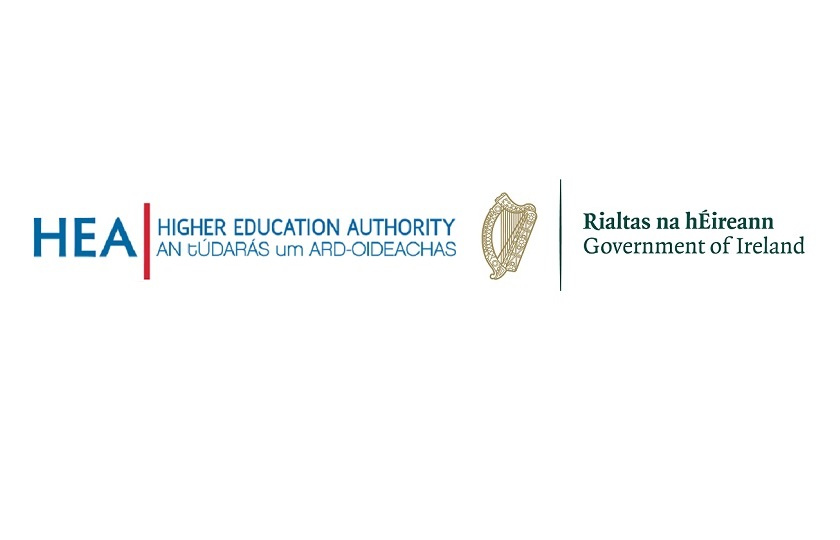
Exam Supports & Alternative Arrangements
Students with disabilities may avail of alternative exam arrangements if this support is deemed necessary as part of the student's needs assessment.
Alternative arrangements are designed to ensure that equitable examination conditions are provided, to enable students to demonstrate their knowledge and competence notwithstanding their disability.
The onus lies on the individual student to ensure that the College is informed of the nature of his or her disability, and to apply for Examination Accommodations. All applications for alternative accommodations must be supported by acceptable medical documentation.
Temporary Condition
If a student requires alternative assessment or examination arrangements due to a temporary disability/medical condition, he or she can request temporary alternative exam arrangements. Students should contact Student Academic Administration with their requests.
Language Exemption
Pre-Entry Application for a Language Waiver
Language Waiver on Disability Grounds
A language waiver is only applicable where a specific language is not a requirement for that course, such programmes in MIC include the BA programmes MI001, MI002, MI007, MI009 & MI010.
Where students have a language waiver, the language subject can be substituted with another subject to meet the 6 subject entry requirement.
How to Apply
To be considered for a language waiver on disability grounds, please:
- Complete the online Language Waiver Application form here
- Email all required supporting documentation to LanguageWaiver@mic.ul.ie before 1 July
Supporting documentation required to accompany your application:
- Download the Language Waiver School Declaration form here - to be completed and signed by your School Principal
- Copy of your Certificate of Exemption issued by the Department of Education signed and stamped by your school principal
Or
Copy of Educational Psychologist Report
Note
- NUI Language Waiver is not Applicable for Mary Immaculate College. The National University of Ireland (NUI) Language Waiver is completely separate. Even if you have a NUI waiver you still need to apply to Mary Immaculate College for a language waiver.
- Existing exemption from the study of Irish granted under Circular 12/96 and M10/94 and held by students will continue to apply.
Additional Application Notes
- Please email supporting documents to LanguageWaiver@mic.ul.ie
- Deadline for submission of language waiver application: 1 July
- You will receive an email acknowledgement of your application once submitted
- Please note that we cannot assess incomplete applications. It is our practice to destroy documents at the end of the year for unsuccessful applicants.
For further information on applying for a language exemption on disability grounds: please email the Access & Disability Office at AccessOffice@mic.ul.ie.
Financial Assistance - Student Assistance Fund & 1916 Bursary
The Student Assistance Fund (SAF) is managed by the Higher Education Authority (HEA) on behalf of the Department of Education and Skills (DES). The SAF is allocated to higher education institutions (HEIs).
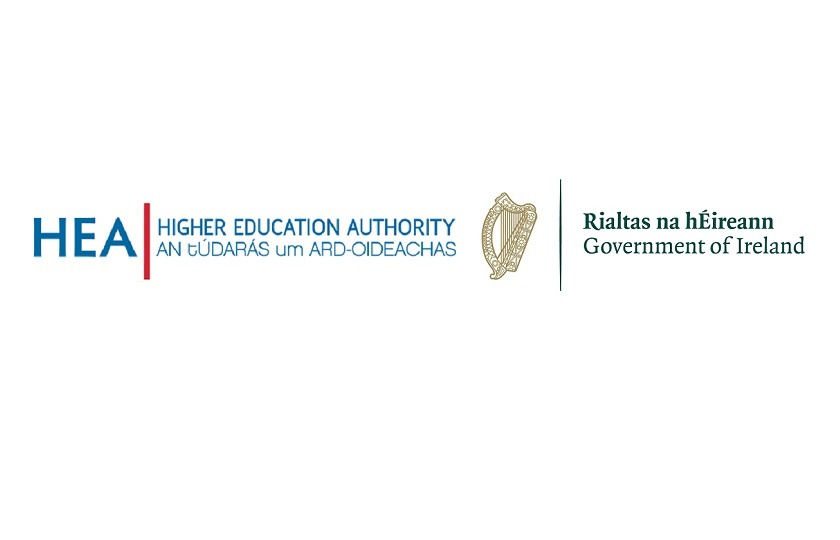
Student Assistance Fund (SAF)
The Student Assistance Fund provides financial support to full or part-time students who are experiencing temporary or ongoing financial difficulties while attending college. The Student Assistance Fund is designed to provide a source of financial support in addition to other sources of income such as SUSI grant.
Students on full- or part-time courses leading to a higher education award at level 6 to 10 of the national framework of qualifications are eligible to apply for SAF. Students will be required to provide financial documentation to support their application. The Student Assistance fund cannot be used for exam or Colleges fees purposes.
Further detailed information on applying for the fund is on the MIC Student Portal and Student Union website.
For more information on the Student Assistance Fund, click here.
1916 Bursary
This Operation is co-funded by the Government of Ireland and the European Union.
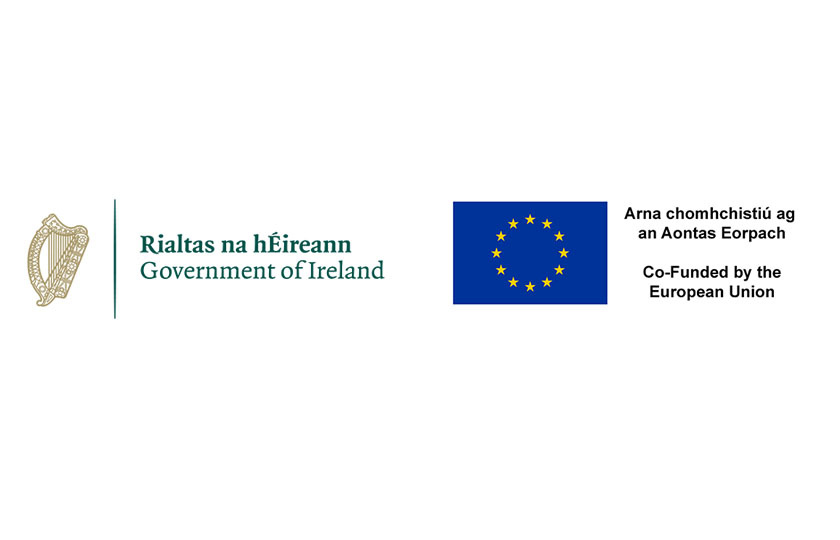
Applications to the 1916 Bursary Fund for the academic year 2024-25 are now CLOSED.
Visit 1916bursary.ie for an online eligibility checker, the 1916 Bursary Applicant Guidelines and the online application form, during the application window.
Additional Questions and Contacts for Queries
For further information please visit The 1916 Bursary Fund.
Please see the Application Explainer video for an overview of the entire application process.
Please use the Criteria Quick Check here to see if you are eligible, and then use Supporting Documentation to help get your documents ready so that you can be assessed as quickly as possible once it opens.
Email: 1916BursaryFund@mic.ul.ie.
HEA Equal Access Survey
What is the Equal Access Survey?
It is a voluntary annual survey of first year full-time and part-time undergraduate new entrants to Higher Education Authority funded institutions.
Why is the Equal Access Survey conducted?
Utilising the information obtained from the Equal Access Survey, the HEA can measure equality of access to higher education and allocate the resources needed to support students of all backgrounds and abilities.
The Equal Access Survey is conducted by MIC on behalf of the HEA. For more information about the survey, please click the link to the Equal access to Higher Education 2024 pdf below.
HEA Equal Access Survey Information Leaflet 2024/25
While all new entrants are encouraged to complete the survey, it is not mandatory.
- About
- Staff
- Policies
- Access Routes to Third Level
- Disability Supports
- Language Exemption
- Financial Assistance - Student Assistance Fund & 1916 Bursary
- HEA Equal Access Survey





